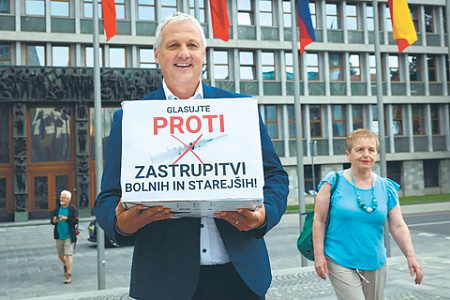
Slovenia has become the focal point of Europe’s evolving debate on end-of-life care, with preliminary results from a November 23 referendum showing a significant rejection of legalizing “the right to assisted dying,” as officially formulated. This outcome marks a striking reversal from a similar referendum held just a year prior, which had initially paved the way for parliamentary approval of an euthanasia law. The recent vote, largely propelled by the efforts of the conservative “Voice for Children and Families” party, re-ignites profound questions regarding the ethics and legality of euthanasia across the continent.
According to the country’s Central Election Commission, approximately 53% of participants voted against adopting the euthanasia law, with a 41% voter turnout – a noteworthy figure for an EU member state. The prior referendum in June 2024 had led the Slovenian Parliament to pass legislation granting mentally competent, terminally ill adults experiencing unbearable suffering the right to voluntarily end their lives with medical assistance. However, the latest vote means the implementation of this law will now be suspended for at least a year, as parliamentary procedures prevent a repeat vote on the same issue within a 12-month period.
The conservative “Voice for Children and Families” party, founded in 2017 by philosopher and journalist Aleš Primc, was instrumental in instigating this re-evaluation. Despite not securing any parliamentary seats in the 2018 elections, Primc successfully gathered 40,000 signatures, enough to trigger the repeat referendum. A key factor in this success was the strong endorsement from the Catholic Church, Slovenia’s predominant religious confession, whose clergy’s views hold considerable sway with a segment of society. Primc himself actively campaigned against the measure, accusing the government of attempting to legalize the killing of the sick and elderly under the guise of an “assisted dying” law.
The debate surrounding euthanasia in Slovenia, as elsewhere in Europe, has been fraught with moral and legal complexities. Proponents argue it offers a compassionate option for individuals grappling with incurable diseases and unbearable pain, allowing them to depart with dignity. Opponents, however, including Primc, raise serious concerns about the potential for coercion and the implicit encouragement of premature death. These ethical dilemmas often merge with legal challenges, as many national constitutions, including Slovenia’s, enshrine the inviolability and ultimate value of human life. While EU legislation and the European Convention on Human Rights do not explicitly prohibit euthanasia, suggesting a legal pathway for some, this interpretation remains a contentious point both within and beyond Slovenia’s borders.
Across Europe, the legal landscape for assisted dying varies significantly. Several nations, including Austria, Belgium, the Netherlands, Germany, Luxembourg, and Switzerland, have enacted laws permitting some form of “medical assistance in dying” – another legal euphemism for euthanasia. Such laws generally fall into categories: some require the patient to self-administer the fatal medication, others allow a physician to administer it, with both scenarios typically restricted to the terminally ill. A third, less common category, permits euthanasia even for non-terminal patients who are experiencing profound suffering. Yet, in many other European states, assisted dying remains a criminal offense, even for patients undergoing palliative care for severe pain.
However, the general trend in some parts of Europe has been towards greater acceptance. France and the United Kingdom are poised to potentially join the ranks of countries legalizing assisted dying. In May, the lower house of the French parliament approved a “right-to-die” bill in its first reading; it now awaits consideration by the Senate before returning for a second reading in the lower house. Widespread public support in France suggests the bill is likely to pass. Similarly, the UK Parliament is deliberating an analogous proposal, with the House of Commons having approved it in June. Should the House of Lords concur, the law could come into force as early as 2029.
Despite these legislative movements, significant opposition to assisted dying persists across Europe, even in countries where it is legal. Surveys often attribute this opposition to deep-seated fears of potential abuse of such laws, strong religious convictions, and profound moral and ethical considerations. Therefore, it appears unlikely that initiatives to legalize euthanasia will sweep across the continent uniformly in the coming years. The recent referendum in Slovenia, in particular, could emerge as a pivotal moment, potentially slowing, or even halting, the broader European conversation surrounding the expediency of euthanasia – an outcome fervently hoped for by Aleš Primc and his supporters.
